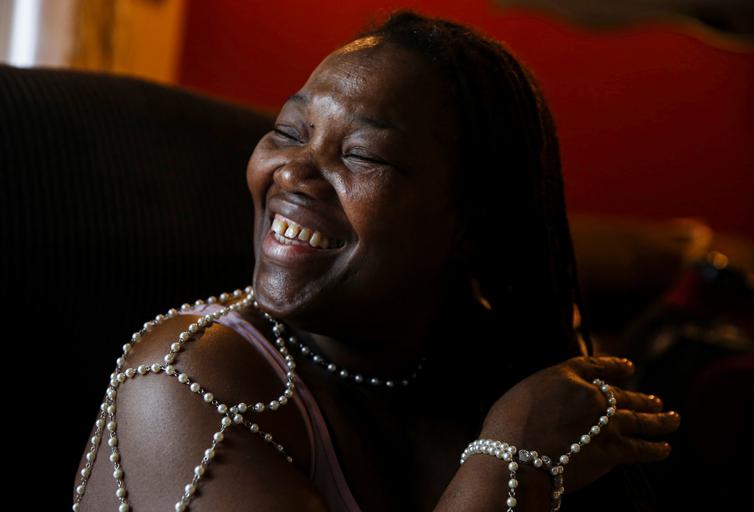
Audrey Butler sat on the couch of her two-bedroom town house in Novato, pulled out her cell phone, and scrolled to a video of herself crooning an old James Brown soul ballad.
It was a warm November afternoon, yellow and crimson leaves bristling outside the small complex where Butler lives near a Trader Joe’s and a commuter railroad crossing. After a rocky year and a half, things were starting to look up.
Although unemployed and recovering from a recent surgery, Butler had sought help to pay the mortgage and keep the electricity on, hired a repair person to fix her broken furnace, and was able to practice singing in her living room, filling the house with her gravelly alto.
In two days, she was set to perform at a free community event at Boeddeker Park in San Francisco’s Tenderloin neighborhood. It’s a place freighted with painful memories for Butler.
“I was homeless in that park,” the 56-year-old mother of three said. “I went to sleep in that park.”
Butler threw back her head and gave a triumphant laugh. “And here, 30 years later, I’m going back to that park, and I’m going to be singing.”
Growing up in the Sunnydale area of San Francisco, Butler learned that she could survive just about any hardship with grit, a sense of humor and a little help from others. Her life took a turn in her teens, when she began using crack cocaine at a time when she also joined the cheerleading squad at Balboa High School.
During that period, crack had begun infiltrating Black and Latino communities, and no one could have predicted the resulting public health crisis, the harsh prison sentences, or the toll it would take on people such as Butler, whose life devolved as she entered adulthood.
By the mid-1980s, Butler — by then a young mother — had fallen into addiction and often wound up sleeping in cars or couch-surfing with family members. Eventually she landed in a drug treatment program in Marin County, which she successfully completed. She would raise her three children in San Rafael, become a mentor to people struggling with addiction, and work in patient admissions at Kaiser Permanente for 13 years.
When Butler lost her job during the pandemic and her unemployment insurance ran out, she turned to the Chronicle Season of Sharing Fund. It covered her mortgage for August, September and October and helped pay her utility bills.
Now I got a second chance at a first-class life.
The fund works throughout the year to prevent homelessness and hunger in the Bay Area’s nine counties. All donations directly help people in need, with administrative costs covered by The Chronicle and the Walter and Evelyn Haas Jr. Fund.
“Now I got a second chance at a first-class life,” Butler exulted.
August and September were excruciating months for anyone who lost work at the beginning of the COVID-19 shutdown, because most people saw their unemployment payments end around that time, said Chris Miranda, safety net services manager at Community Action Marin, a nonprofit that fights poverty.
“Everyone was trying to scramble,” Miranda said of his clients in Marin County, where the cost of living is high enough that people with minimum-wage jobs generally have to live with extended family or rent apartments with roommates.
Some clients of Community Action Marin got so desperate when rent and mortgage payments came due, Miranda said, that they began working as day laborers, waiting at the local truck stop each morning to pick up whatever jobs they could.
In some ways, Butler was more fortunate. Recuperating from surgery for the past several months, she took online classes to become a medical assistant and indulged her passions.
The devastation of COVID-19 may “leave a financial scar,” Miranda said, “not only on folks receiving (checks from) the state Employment Development Department, but on people not eligible” for that money, because they were paid under the table before their work evaporated.
In some ways, Butler was more fortunate. Recuperating from surgery for the past several months, she took online classes to become a medical assistant and indulged her passions. She makes elaborate jewelry, including beaded vests that dangle from a coat rack in her living room. And she sings the whole canon of R&B hits, sometimes practicing with a group of friends she met at karaoke clubs.
Though she is grateful for her hobbies and her home, Butler still has to come up with creative strategies and rely on family to survive. December brought new travails. After her 2018 Jeep Liberty broke down, she began borrowing her son’s car during the day until its engine sputtered. Without a functioning car or consistent income, she scrapes by on charity donations and income from selling jewelry.
“So I’m just figuring it out,” she said, drawing a breath. Her voice had an edge of desperation.
Sometime in the new year she has to have both knees replaced. After she’s healed, she said, she’ll return to the job market.
Rachel Swan is a San Francisco Chronicle staff writer. Email: rswan@sfchronicle.com Twitter: @rachelswan
Read full article here: https://www.sfchronicle.com/bayarea/article/No-stranger-to-homelessness-Novato-resident-16728084.php#photo-21859992
